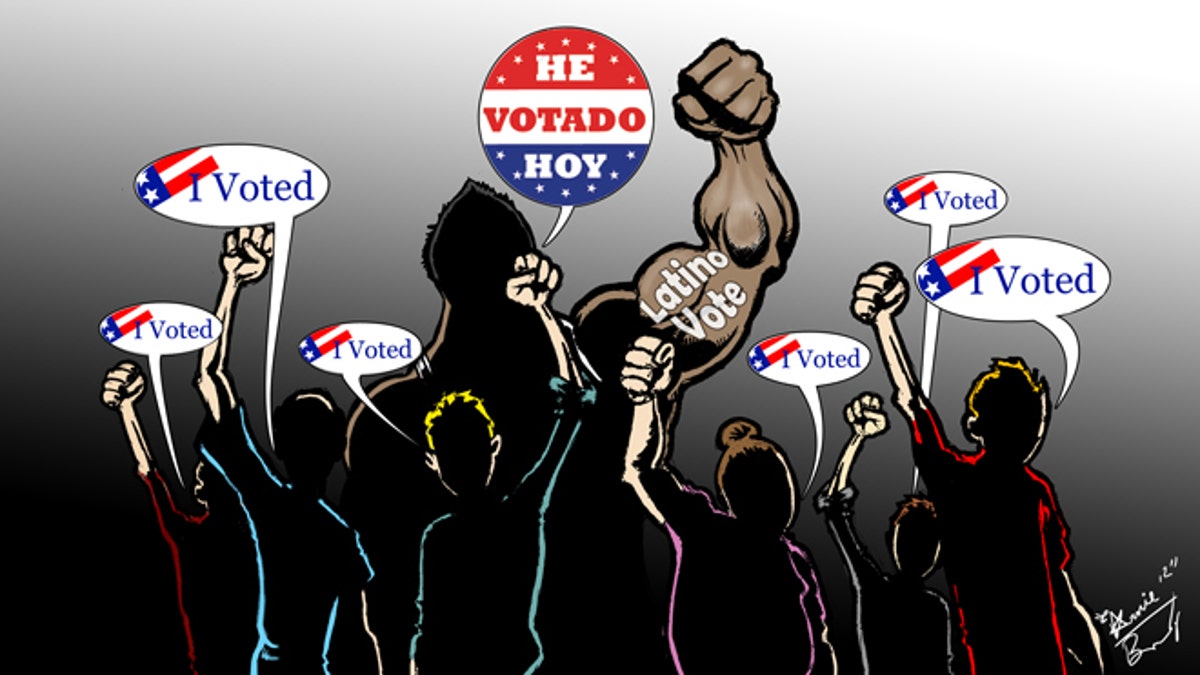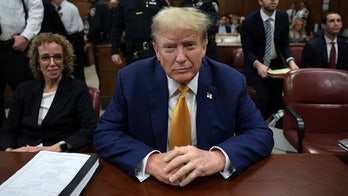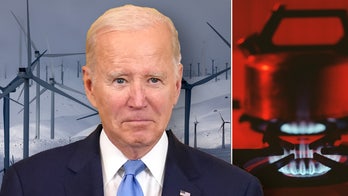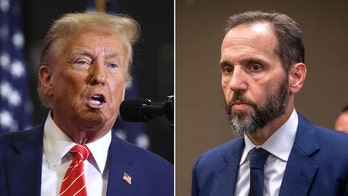
(Arnie Bermudez)
The record, double-digit turnout by Latino voters on Tuesday – seen by experts as tipping the election in favor of President Barack Obama – shows that the long-dubbed Sleeping Giant is wide awake.
“It’s unequivocally clear now that the road to the White House goes through Hispanic neighborhoods,” said Clarissa Martinez, director of civic engagement and immigration at the National council of La Raza, or NCLR, the nation’s largest Hispanic civil right group.
“Our community cares deeply about restoring the American Dream for all, expanding economic opportunity, and resolving immigration once and for all. The real work on common sense solutions begins now, and Latinos will be a powerful ally in moving the nation forward together.”
Roughly 50 percent of Latino voters cast their ballots, comprising 10 percent of Tuesday’s turnout. That exceeded the record set in 2008, when Latinos made up a record 9 percent of all voters.
Exit polls show that 71 percent of Latino voters chose Obama, compared with just 27 percent who picked his Republican challenger, Mitt Romney. That marks the widest gap in Latino support between two presidential candidates.
“The most historic thing in this election is that for the first time in history, the share of the national popular vote margin is smaller than the Latino vote margin,” said Gary Segura, professor of American Politics and Chair of Chicano/a Studies at Stanford University and Principal at Latino Decisions. “That means that if Latinos had evenly divided their vote between both candidates, the outcomes would be reversed.”
A record 24 million Latinos are eligible to vote; 12 million are believed to have gone to the polls.
Latinos were not blindly enthralled with Obama during his first term.
It’s unequivocally clear now that the road to the White House goes through Hispanic neighborhoods.
At one point, some political observers and Latino leaders wondered if, like other Americans, Latinos would be less inclined to turn out at the polls this year because of the absence of the 2008 excitement over electing the nation’s first African-American president, combined with disappointment over the slow economic recovery and lack of progress on immigration reform.
But hard-line stances by Republicans, and Romney himself, about issues such as immigration, government assistance programs and affordable healthcare became a rallying point for Latino leaders and the Obama campaign, who warned that a Romney presidency would create hardship for Latinos and fuel hostility against them.
And pressure mounted on Obama to address the growing Latino skepticism of him. Obama had courted Latinos in 2008 with a promise to reform immigration in his first term, but never seemed to fight for it like he did for an overhaul of healthcare. What is more, more immigrants – about 400,000 a year -- were deported under his watch than under any other president.
So in June, the Obama administration announced that it would suspend deportations for undocumented immigrants brought to the United States as minors, and who meet a strict set of criteria. The initiative also called for giving those who qualify for the reprieve work permits. The move, polls showed afterward, raised his popularity among Latinos.
At the same time, Romney, when pressed, said that if he became president, he would discontinue the initiative, though he was unclear about what, exactly, he would do with the nearly 1 million people who are expected to benefit from it.
But Romney never really gained the confidence of most Latinos – who saw him as someone who did not respect them, and someone who was unsympathetic to the struggles of many in their community.
GOP efforts to send messages, and envoys, to reach out to Latinos did not lessen the feelings ranging from doubt to anger among Latinos that followed such things as the Republican party’s platform adopted at the Republican National Convention in August that called for a hard line on immigration, as well as a nearly all-white convention hall of delegates that stood in contrast to the diverse speakers on the stage.
“Strident and extreme positions and the lack of support for legislation promoting public education, affordable health care and economic policies that increase opportunities for Latino communities did not go unnoticed,” said Ben Monterroso, national executive director for Mi Familia Vota Education Fund.
“The Latino vote has demonstrated its essential role in local, state and presidential elections and the 2012 election will be remembered as the cycle that showed just how critical it is to understand the issues that affect the Hispanic community.”
Many Latino organizations launched highly publicized voter registration drives, with some of them signing up tens of thousands of new voters.
It is the kind of growing political power Latino leaders expect to continue, given that some 900,000 Latinos each year turn 18 years old. Latinos between 18 and 29 years old were the most supportive of Obama, with 74 percent voting for him, compared with 23 percent who voted for Romney.
Also, Latinos are active users of social media, an increasingly influential dimension of politics. Many used Twitter and Facebook to encourage others to vote.
"This is a sign that if invited and if informed, Latinos will participate in our democratic process, making them a core-voting bloc of the American electorate,” said Monterroso. “The 2012 election is a story of the Latino arrival; an optimistic group of voters who are playing a key role in rebuilding this country and trusting government to play a role.”
Undocumented immigrants, in their own way, had an influence.
So-called DREAMers, brought to the United States as minors, came out of the shadows, and held press conferences and rallies and even took their demonstrations right to the presidential candidates.
For the first time ever, an undocumented immigrant -- Benita Veliz, a 27-year-old from San Antonio -- was a primetime speaker at a presidential national convention. She appealed to Americans to re-elect Obama so that the flawed immigration system could be reformed to provide a pathway to legalization.
“It was a sign of acceptance for DREAMers at the highest political levels that would have been unthinkable even three years ago,” said Frank Sharry, executive director of America’s Voice, which advocates for legislation to give legal status to undocumented immigrant, in a New York Times article. “The president leaned in to the issue instead of steering clear of it, and it is putting a lot of pressure on Republicans who labeled these immigrants as criminals in their platform.”
Latino Republican organizations expressed frustration over the defeat of Romney, as well as over what they said were concerns about the continuing alienation between Republicans and Latinos.
“When Newt dropped out of the race and Mitt Romney became the nominee, we decided to support Mitt Romney,” said a statement by Café Con Leche, a Republican organization that favors comprehensive immigration reform. “Numerous attempts to connect with the Romney campaign's Hispanic outreach proved fruitless. In our one year of existence, we've also had just one conversation with the RNC's Latino outreach, and were left with the impression the RNC wasn't interested in working with us due to our pro-immigration focus.”
“Harsh rhetoric on immigration coupled with lack of adequate engagement with Latinos and race baiting by Democrats has resulted in very low GOP support among Latinos, and we ignore this at our own political peril.”




